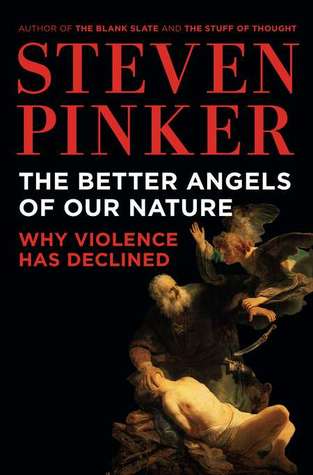The Enlightenment Ideal Ingrained in Culture
You and I ought to reach this moral understanding not just so we can have a logically consistent conversation but because mutual unselfishness is the only way we can simultaneously pursue our interests. You and I are both better off if we share our surpluses, rescue each other’s children when they get into trouble, and refrain from knifing each other than we would be if we hoarded our surpluses while they rotted, let each other’s children drown, and feuded incessantly. Granted, I might be a bit better off if I acted selfishly at your expense and you played the sucker, but the same is true for you with me, so if each of us tried for these advantages, we’d both end up worse off. Any neutral observer, and you and I if we could talk it over rationally, would have to conclude that the state we should aim for is the one where we both are unselfish.
Morality, then, is not a set of arbitrary regulations dictated by a vengeful deity and written down in a book; nor is it the custom of a particular culture or tribe. It is a consequence of the interchangeability of perspectives and the opportunity the world provides for positive-sum games. This foundation of morality may be seen in the many versions of the Golden Rule that have been discovered by the world’s major religions, and also in Spinoza’s Viewpoint of Eternity, Kant’s Categorical Imperative, Hobbes and Rousseau’s Social Contract, and Locke and Jefferson’s self-evident truth that all people are created equal.
From the factual knowledge that there is a universal human nature, and the moral principle that no person has grounds for privileging his or her interests over others’, we can deduce a great deal about how we ought to run our affairs. A government is a good thing to have, because in a state of anarchy people’s self-interest, self-deception, and fear of these shortcomings in others would lead to constant strife. People are better off abjuring violence, if everyone else agrees to do so, and vesting authority in a disinterested third party. But since that third party will consist of human beings, not angels, their power must be checked by the power of other people, to force them to govern with the consent of the governed. They may not use violence against their citizens beyond the minimum necessary to prevent greater violence. And they should foster arrangements that allow people to flourish from cooperation and voluntary exchange.
This line of reasoning may be called humanism because the value that it recognizes is the flourishing of humans, the only value that cannot be denied. I experience pleasures and pains, and pursue goals in service of them, so I cannot reasonably deny the right of other sentient agents to do the same.
If all this sounds banal and obvious, then you are a child of the Enlightenment, and have absorbed its humanist philosophy. As a matter of historical fact, there is nothing banal or obvious about it. Though not necessarily atheistic (it is compatible with a deism in which God is identified with the nature of the universe), Enlightenment humanism makes no use of scripture, Jesus, ritual, religious law, divine purpose, immortal souls, an afterlife, a messianic age, or a God who responds to individual people. It sweeps aside many secular sources of value as well, if they cannot be shown to be necessary for the enhancement of human flourishing. These include the prestige of the nation, race, or class; fetishized virtues such as manliness, dignity, heroism, glory, and honor; and other mystical forces, quests, destinies, dialectics, and struggles.
Notes:
Folksonomies: enlightenment morality social contract
Taxonomies:
/family and parenting/children (0.451312)
/society/welfare (0.445741)
/science/social science/philosophy (0.420537)
Keywords:
Enlightenment Ideal Ingrained (0.974054 (positive:0.769586)), logically consistent conversation (0.963270 (positive:0.769586)), universal human nature (0.911054 (positive:0.420913)), vengeful deity (0.797156 (negative:-0.425974)), moral understanding (0.794912 (positive:0.769586)), mutual unselfishness (0.787618 (positive:0.577633)), people (0.784010 (positive:0.182263)), neutral observer (0.781568 (neutral:0.000000)), disinterested third party (0.781016 (negative:-0.304163)), Categorical Imperative (0.780928 (neutral:0.000000)), human flourishing (0.780816 (neutral:0.000000)), anarchy people (0.780463 (negative:-0.440357)), arbitrary regulations (0.777998 (negative:-0.425974)), Enlightenment humanism (0.776332 (neutral:0.000000)), positive-sum games (0.774789 (positive:0.765784)), constant strife (0.774749 (negative:-0.625652)), Spinoza’s Viewpoint (0.773988 (neutral:0.000000)), particular culture (0.773829 (negative:-0.267006)), factual knowledge (0.773359 (positive:0.420912)), Social Contract (0.772572 (neutral:0.000000)), greater violence (0.771101 (negative:-0.543768)), major religions (0.769374 (neutral:0.000000)), moral principle (0.768003 (neutral:0.000000)), Golden Rule (0.767489 (neutral:0.000000)), good thing (0.765304 (neutral:0.000000)), self-evident truth (0.765156 (negative:-0.415940)), human beings (0.765145 (neutral:0.000000)), great deal (0.764718 (positive:0.289793)), individual people (0.764389 (neutral:0.000000)), sentient agents (0.763776 (negative:-0.437082))
Entities:
Hobbes:Person (0.969315 (neutral:0.000000)), Social Contract:Degree (0.952603 (neutral:0.000000)), Locke:Person (0.934108 (negative:-0.415940))
Concepts:
Humanism (0.951253): dbpedia | freebase
Morality (0.902877): dbpedia | freebase
Immanuel Kant (0.818501): dbpedia | freebase | opencyc | yago
Religion (0.792314): dbpedia | freebase | opencyc
Age of Enlightenment (0.791979): dbpedia | freebase | yago
Human (0.648747): dbpedia | freebase | opencyc
Ethics (0.509641): dbpedia | freebase
John Locke (0.507219): dbpedia | freebase | opencyc | yago





